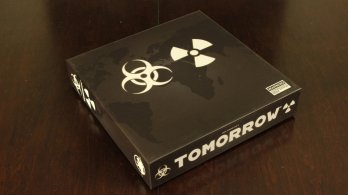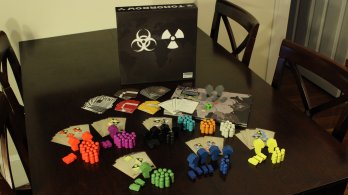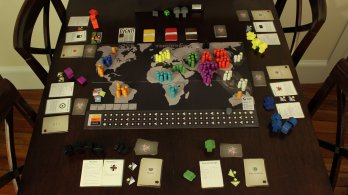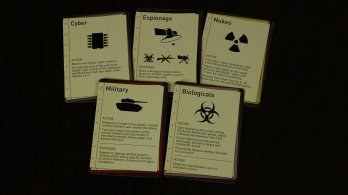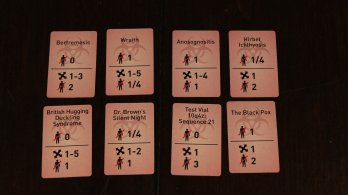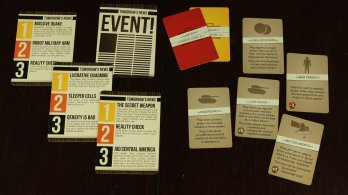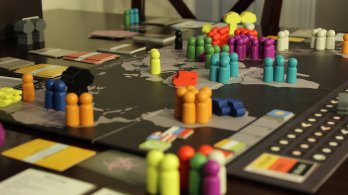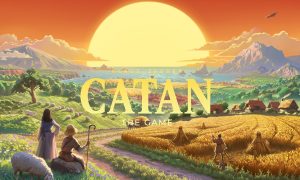With arguably the most accessible theme ever, Pandemic beckons us in with the call to save humanity. Who could possibly protest that theme? Sure, some people may not be as enamored, but at the very least, most will accept the premise as acceptable. Tomorrow takes that idea and runs in the opposite direction. Saving humanity? No! Bring out the weaponized bio-hazards: it is time to kill millions. Pitting the last superpowers against each other in a time of catastrophe, Tomorrow opens the door to a hypothetical scenario that at the very least could be described as ‘edgy.’ No, this is not your grandma’s sterile euro. This is Tomorrow.
In the not-so-far future, the world is faced with the hard choice of either facing the total extermination of the human race or a rapid depopulation of the globe. If we end up surviving, the power who can gain the most political capital over the course of the catastrophe will be able to seize control of the ruins of the human race. One thing is clear though, people need to die.
Overview
In Tomorrow, players take on the role of a superpower trying to deal with the reality that the world needs less people in it. Players pick a power: USA, Russia, China, The European Union, India or a newly formed Arab Caliphate. The game board is populated at the start of the game with population pawns, each representing 70 million people. The pawns make up different subsets of the global population, and are colored as such. Russia only has three pawns to start with as compared to China’s twenty pawns. In addition to their population, players also start with military forces and nuclear weapons. As with population pawns, not all is equal here. The USA is a military powerhouse compared to the rest of the powers. Each power also has one distinct ability that affects game play is some major way. For example: the EU determines turn order, and the USA can utilize the CDC to try to neutralize biological attacks.
[singlepic id=18122]
The game is played over nine rounds. If at the end of the ninth round, the population has not been stabilized, then the world is destroyed and no one wins. At the start of a round, an event card is revealed that will change that specific round in some way. Before turn order is determined, players pick two actions cards out of their deck placing them face down. Turn order is picked one player at a time, as the round is played out. When it is a player’s turn, they will chose to reveal one of their two actions cards and take the associated action. After every player has gone once, each player gets another action.
Each superpower has roughly the same action deck that forms what the player can do on their turn. The general actions are: Biohazard attack, Military action, Espionage, Cyber attack and the dreaded Nuclear attack. The most used action is the bio attack that allows for disease cards to be played. These diseases are the major avenue for relieving the world of population. What is global domination without tanks? The military actions lets players take control of minor powers on the board, possibly giving bonuses. Cyber attacks are a more subtle strategy aimed at dominating cyberspace, resulting in strategy cards for the controlling player (more on that later). Espionage actions are entirely reactionary, these actions are played as a way to cancel someone else’s action, during their turn. Lest we forget Nuclear attacks. These nasty actions are bad all around, games quickly devolve when nukes start flying.
It should be noted, that there is open negotiation during the game. Players can beg for mercy or threaten retaliation. Most of the mechanics of the game are set up to provide room for player interaction.
Strategy cards are awarded to players who control minor powers at certain points in the game, as well as possibly to the player with control of the cyber card. Strategy cards give flavor and flair to the narrative of the game. These cards can either give a special power, award end game points, or give negative points to an opponent.
Paying attention to the global impact track is essential as it keeps record of how far the globe is from stabilization. Whenever a disease removes a population pawn the track is reduced based on where the pawn came from. If the pawn came from the US, the track will be reduced by three spaces, but if it is removed from India, it will only be reduced by one. This makes the sparse populations of Russia and US prime targets. Whenever a nuclear attack takes place, the track moves UP three spaces, thereby delaying the end of the game. The moment the global impact track reaches the end, the game is over. Player’s political capital points are calculated based on how many population pawns they still have on the board, how many they removed from the board, how many pawns are in countries they control, how many nukes they have launched or been victim to, and any other points from strategy cards. The player with the most political capital is declared the superpower of the new world and the winner.
Things and Bits:
The art work for the game is functional and minimalistic. The cover of the box has no writing, just a very imposing biohazard and nuclear symbol. The board only adds to the bleak nature of the theme. Component quality is crazy high. It might be due to my copy being a Kickstarter version, but the game looks impressive out on the table. The best bit being the giant, chunky mushroom clouds that are used in place of nuclear tokens. This high craftsmanship is becoming a trend for Conquistador Games, a trend that I look forward to seeing in the future.
[singlepic id=18121]
The rulebook makes the game borderline unplayable. After two play throughs, and four different people reading through the rules cover to cover, we still messed some things up. The biggest issue is that the rules are big blocks of text with no distinction between clarification or statement. There are no bullet points, or bolded text to point out the important facts. The rules are grouped together logically, but displayed so densely that it is hard to determine what is important. In addition, you get no help from the examples as they only outline the very basic actions, not clarify the complex situations. All this aside, there is no mention of the Central Asia territory anywhere in the book, a location on the map that that comes up on multiple strategy cards and event cards. Obviously you can find Central Asia on the map, but there is no clarification that it is anything but Arab Caliphate territory (which it is not…).
The game almost requires six people. The four player game we played never even made it past the middle of the global threat track (we all lost the game, no winner). This high player requirement is not a bad thing though as the game is based around negotiation, leading to constant player involvement. For your first game, set aside three hours as it will take some time to figure out how the game works. Once everyone knows what is going on, 90 to 120 minutes is reasonable.
Thoughts:
Let’s address the big elephant: Tomorrow has a gruesome theme. The designer makes note of it in the rule book, as well as many online comments, that this is a hypothetical, what-if scenario. It almost plays out as a grim satire, especially with some of the events that come up. While the game abstracts and tones down the atrocities, it can still put some people off. At least the disease names are tongue in cheek to help relieve the seriousness. Tomorrow is not for the faint of heart.
If you have read some of my other reviews, in particular one about a zombie attack on a town, you will know that I am not a huge fan of negotiation games. Yet I really enjoyed Tomorrow. One of it’s strengths as a negotiation game is that every action is destructive in nature. There are no ‘helpful’ actions. Players who have been through a game realize that pawns are going to be lost. There is absolutely no way for a player to finish the game with 100% of their pawns intact. This means that negotiation boils down to attack him not me! This framework is perfect at balancing the very powerful abilities that each player has. If the Arabs use their special terrorist action too many times, everyone is going to team up on them. I am not sure I have played a game with such high player interaction. The constant threat to your playing position causes everyone to be constantly involved in every negotiation. Even players who are trying to be quiet and reserved are forced into the conversation.
One downside to the destructive nature of the game is the swings of power that can happen. The player who enters the last round of the game in the lead is never the player who wins. Just about all of the information is open, giving people the opportunity to calculate how many points you have (and then tell everyone you are in the lead). I am undecided if this is a good or a bad thing. On one hand you never have a runaway leader for very long, but on the other, it is really hard to mask your achievements. Either way, you can feel the the chaos of the theme.
The asymmetric nature of the different super powers makes each game feel very different. With different scoring opportunities, different powers and different starting states, you can play this game 6 times and have a very different experience every time. An argument can be made that some superpowers have an advantage, but that does not go unnoticed in the first few rounds. The player’s differences have a large thematic effect as well. Players take ownership of their superpower, they embrace who they are playing as. It is hard to resist pulling stereotypes in to the game, and at least one person is going to speak in a foreign accent.
[singlepic id=18126]
Once the rule book has been deciphered, the game plays quite smoothly for having such high player interaction. Once everyone understands the structure of a round, they go by quickly. When picking actions, players only have 5 or 6 actions to pick from, making the initial choices relatively easy. A secondary choice is made when the action is played, but they are separated enough that the choices remain concise, yet still very satisfying. The addition of reactionary cards (espionage and military actions) provide for interesting negotiating standoffs. Open discussion occurs about if someone should block an action, or if that block will be blocked. This one-upmanship is limited by the two actions that can be used, so the player who plans the best will generally come out on top.
Another side effect of the destruction in Tomorrow is making the game a bear to play with two types of gamers: whiners and jerks. The first round through the last round, someone who is prone to whining is going to let everyone know how unfair the game is. They do not accept that everyone is losing pawns too… that it is part of the game to lose population. If you have a whiner in your group, be careful. Don’t let them be China or India (they end up losing the most population). The other problem gamer is the jerk. If someone wants to, they can ruin the game for everyone by pushing the global impact track up. If this person is the US or Russia (high nuke counts) they can kill the game outright. Sure, nukes are to be used for retaliation, but if one person decides to be mean to another player, they can ruin them. Each nuke at the end of the game is minus three points for both the attacker and the victim. With the end game scores ranging between 10 and 20, a jerk playing the US can deliver minus fifteen points, effectively taking their target out of the game.
Tomorrow
Designed by: Dirk Knemeyer
Published by Conquistador Games
Players: 4-6
Time: 90 Minutes
Ages 13+
Mechanic: Negotiation, Action Selection, Asymmetric Players
Weight: Medium
MSRP: $60
From Trading in the Mediterranean to FPS, I love games. While I grew up in a house without consoles, PC gaming and board gaming were a large part of my formative years, and continue to influence my life. In this golden age of board gaming, I have jumped in headfirst in to anything table top. As a ludilogical student, I love thinking about how games work, their mechanics, their elegance and most importantly, enjoying how fun they are.
Favorite Board Game (at the moment): Twilight Struggle
Favorite PC Game (base solely on play time): Tie between WoW and DII
Fell free to email me: comments, concerns, questions, feedback, rants, and/or suggestions.

With a dark theme, and a destructive playing style, Tomorrow is not for everyone. For those people who can embrace the theme and get into the game, it is an experience that comes with very high energy and lots of fun. Tomorrow is a negotiating game that will test your wits, your diplomacy, and your foresight. That is, of course, if you can make it through some of the worst rules I have ever had to read. I would not recommend this game to all, but I am definitely excited about Tomorrow.
PROS
- high player interaction
- quality components
- asymmetric player powers
CONS
- rulebook is bad. really bad
- possible for one player to ruin the game
- tends to be swingy
See below for our list of partners and affiliates:

